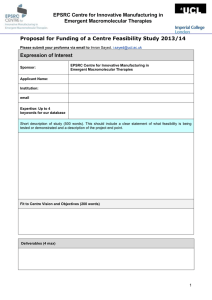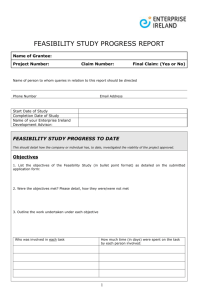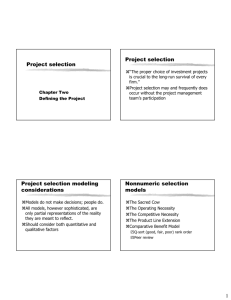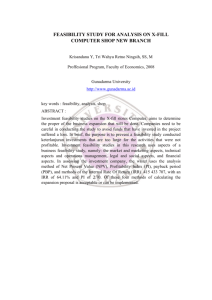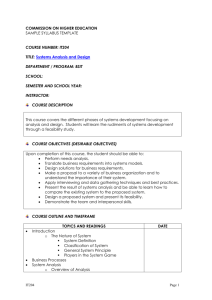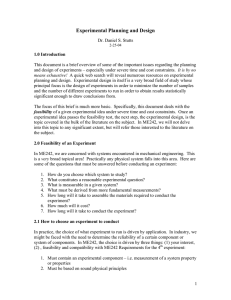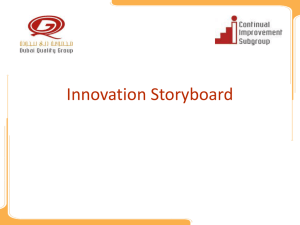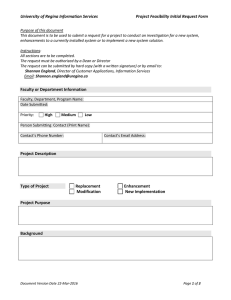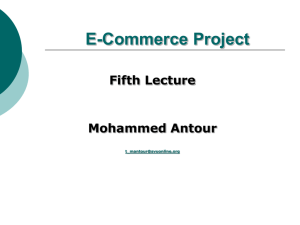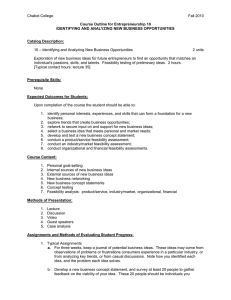EPSRC Centre for Innovative Manufacturing in Emergent Macromolecular Therapies Feasibility Studies 2013/14
advertisement
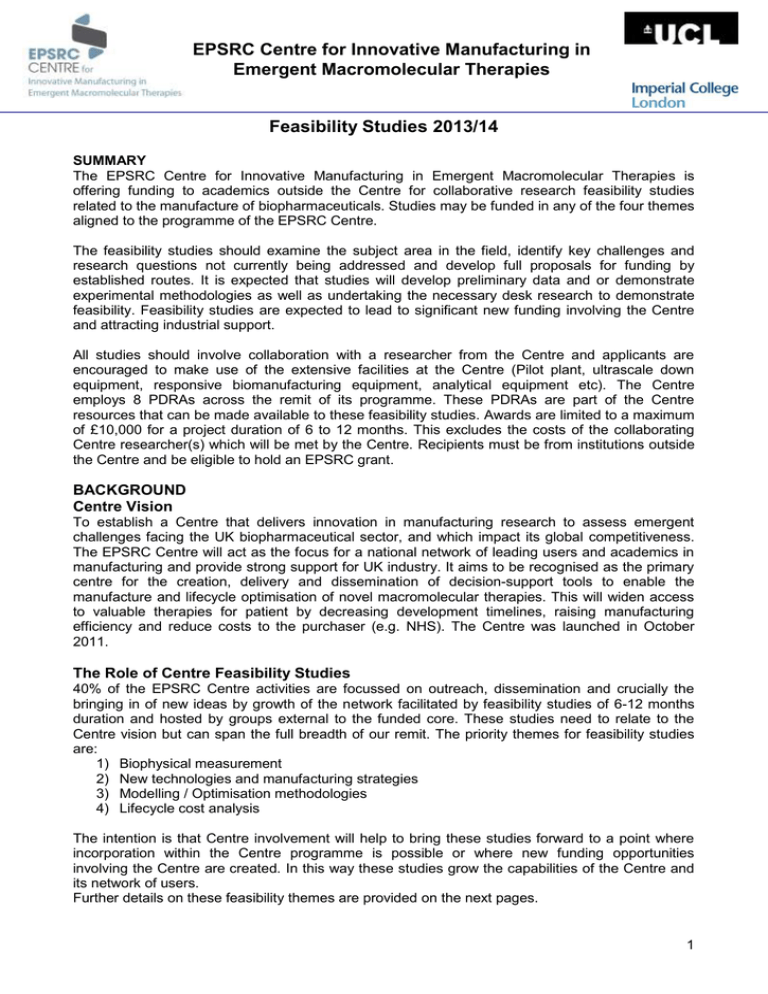
EPSRC Centre for Innovative Manufacturing in Emergent Macromolecular Therapies Feasibility Studies 2013/14 SUMMARY The EPSRC Centre for Innovative Manufacturing in Emergent Macromolecular Therapies is offering funding to academics outside the Centre for collaborative research feasibility studies related to the manufacture of biopharmaceuticals. Studies may be funded in any of the four themes aligned to the programme of the EPSRC Centre. The feasibility studies should examine the subject area in the field, identify key challenges and research questions not currently being addressed and develop full proposals for funding by established routes. It is expected that studies will develop preliminary data and or demonstrate experimental methodologies as well as undertaking the necessary desk research to demonstrate feasibility. Feasibility studies are expected to lead to significant new funding involving the Centre and attracting industrial support. All studies should involve collaboration with a researcher from the Centre and applicants are encouraged to make use of the extensive facilities at the Centre (Pilot plant, ultrascale down equipment, responsive biomanufacturing equipment, analytical equipment etc). The Centre employs 8 PDRAs across the remit of its programme. These PDRAs are part of the Centre resources that can be made available to these feasibility studies. Awards are limited to a maximum of £10,000 for a project duration of 6 to 12 months. This excludes the costs of the collaborating Centre researcher(s) which will be met by the Centre. Recipients must be from institutions outside the Centre and be eligible to hold an EPSRC grant. BACKGROUND Centre Vision To establish a Centre that delivers innovation in manufacturing research to assess emergent challenges facing the UK biopharmaceutical sector, and which impact its global competitiveness. The EPSRC Centre will act as the focus for a national network of leading users and academics in manufacturing and provide strong support for UK industry. It aims to be recognised as the primary centre for the creation, delivery and dissemination of decision-support tools to enable the manufacture and lifecycle optimisation of novel macromolecular therapies. This will widen access to valuable therapies for patient by decreasing development timelines, raising manufacturing efficiency and reduce costs to the purchaser (e.g. NHS). The Centre was launched in October 2011. The Role of Centre Feasibility Studies 40% of the EPSRC Centre activities are focussed on outreach, dissemination and crucially the bringing in of new ideas by growth of the network facilitated by feasibility studies of 6-12 months duration and hosted by groups external to the funded core. These studies need to relate to the Centre vision but can span the full breadth of our remit. The priority themes for feasibility studies are: 1) Biophysical measurement 2) New technologies and manufacturing strategies 3) Modelling / Optimisation methodologies 4) Lifecycle cost analysis The intention is that Centre involvement will help to bring these studies forward to a point where incorporation within the Centre programme is possible or where new funding opportunities involving the Centre are created. In this way these studies grow the capabilities of the Centre and its network of users. Further details on these feasibility themes are provided on the next pages. 1 EPSRC Centre for Innovative Manufacturing in Emergent Macromolecular Therapies The Application and Selection Process Applications will be via a rapid 2-stage process to facilitate a fast reactive turnaround. The initial expression of interest uses a pro-forma which should be sent to Imran Sayed at I.Sayed@ucl.ac.uk. Applicants should discuss the proposed project with a Centre researcher before submitting an outline application. Contact details for the principal investigators are given with the theme descriptions later in this document. The Centre Academics and Advisory Board will formally rank each proposal and provide a go/no go/defer decision. The second stage is a 2 page workplan of the study with milestones and deliverables. Provided this is accepted by the Centre Management, funding will be allocated and work/recruitment can commence. The assessment will take into account the following criteria: • Innovation • Relevance to Centre goals • Potential for new collaborative grant proposals involving Centre investigators • Capabilities of the research group to deliver • Level of commitment from the university Centre Investment in Feasibility Studies To gain most advantage of each funded study the Centre will assign a Centre academic to help in the project management, delivery of the study goals and knowledge transfer. In this way the strategic objectives of the Centre are best met and the potential upside of new grant wins for the host institution are maximised. The Centre will prepare a collaboration agreement which includes provisions for IP arrangement and confidentiality for each study funded. The terms are based on standard EPSRC research agreements. The specific goal is to ensure equitable and competent IP protection to facilitate later collaborative effort should this be appropriate. Further information In the first instance please contact Imran Sayed Email: i.sayed@ucl.ac.uk 2 EPSRC Centre for Innovative Manufacturing in Emergent Macromolecular Therapies Centre Feasibility Themes Feasibility Theme 1: Principal Investigator: Biophysical Measurement Dr Paul Dalby, p.dalby@ucl.ac.uk Core research will focus on: Establishing biophysical measurements that correlate to specific manufacturability issues for bulk products and final dosage forms. Feasibility projects are welcome in relevant areas, including: Emerging techniques for biophysical analysis. Computational modelling of protein structure and properties. Assessment of new product types, formulations and delivery modes. User Demonstration Projects: Specific assessment of biophysical methods on user specific molecules. Use of additional biophysical techniques available at user sites. Application to user specific process steps. Feasibility Theme 2: Principal Investigator: New technologies and manufacturing strategies Professor Nigel Titchener-Hooker, nigelth@ucl.ac.uk Core research will focus on: Step change DSP operations or process materials and the introduction of novel manufacturing methods. Feasibility projects are welcome in the following areas, including: Novel adsorbent designs. Process integration. Continuous processing. Hybrid methods of manufacture. User Demonstration Projects: Testing the impact of new approaches in a real industrial setting. Evaluating new technologies with realistic feed materials. 3 EPSRC Centre for Innovative Manufacturing in Emergent Macromolecular Therapies Feasibility Theme 3: Principal Investigator: Modelling/optimisation methodologies Dr Suzy Farid, s.farid@ucl.ac.uk Core research: Focuses on development of mathematical programming and evolutionary frameworks to optimise purification operations. Feasibility projects are welcome in the following areas, including: Predicting performance from process parameters and protein properties. Approaches for handling uncertainties during optimisation. Hybrid mathematical programming and heuristic solution algorithms. Statistical algorithms to analyse stochastic process datasets. Predictive models for novel chromatography resins/configurations. User Demonstration Projects: Test predictive correlations with user process data and proteins Feasibility Theme 4: Principal Investigator: Lifecycle cost analyses Dr Suzy Farid, s.farid@ucl.ac.uk Core research will focus on: Generating tools to predict the cost of manufacture and the cost of treatment as a consequence of decisions made during manufacture and product design. Feasibility projects are welcome in the following areas, including: Contribution of manufacturing costs to overall drug price. Impact of mode of administration on health-related quality of life. Potential impact of value based pricing. User Demonstration Projects: How and to what extent is the cost-effectiveness of the final product considered at the manufacturing and product design stage? Impact of process changes or reformulations on lifecycle management? 4
